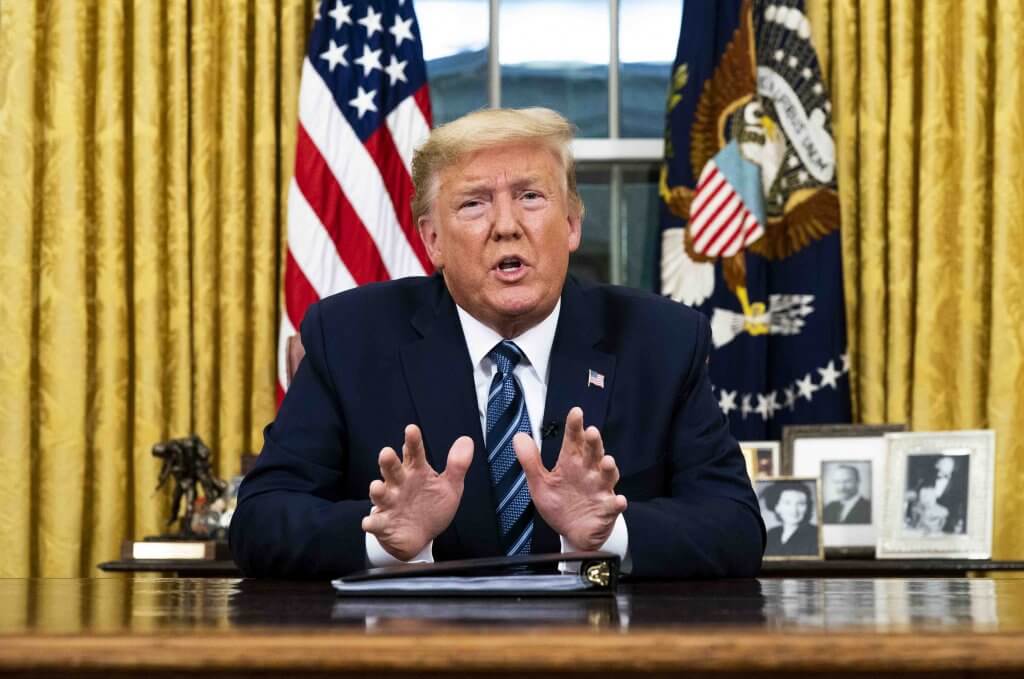Trump Reluctantly Invoked an Obscure Wartime Power. Here’s What It Means.

As his administration came under fire for its handling of the COVID-19 outbreak, President Donald J. Trump last week invoked an obscure Korean War-era law to force General Motors to manufacture ventilators that could save patients’ lives.
But Trump waited weeks to do so, raising questions about how effective his actions would be.
“Our fight against the virus is too urgent to allow the give-and-take of the contracting process to continue to run its normal course. GM was wasting time,” Trump said as he invoked the Defense Production Act on March 27. “Today’s action will help ensure the quick production of ventilators that will save American lives.”
Several governors and congressional Democrats had pressed Trump for weeks to use the Defense Production Act, arguing that the president could harness the power of American businesses to produce ventilators and protective medical gear before the number of COVID-19 patients in the country spiked.
The law gives the federal government special powers to support the military or protect homeland security. It allows the federal government, for example, to prioritize its own orders above a company’s other customers for items that it deems necessary. Federal agencies can also conserve valuable resources or incentivize production of certain goods with loans or purchase agreements.
Trump and his administration resisted calls to use the law to address COVID-19, the disease caused by a new coronavirus, even though invoking the law is standard practice in national emergencies. During 2018, for example, the Trump administration used the law more than 1,300 times for homeland security purposes. And the Defense Department estimates that it has used the law’s powers 300,000 times a year, The New York Times reported.
“Approximately half of these rated orders involved resources needed to house and feed disaster survivors and first responders, communications equipment and information technology needs and other logistical needs supporting disaster response and recovery efforts,” the Federal Emergency Management Agency reported.
The president, though, likened the use of the law for coronavirus supplies as “nationalizing” U.S. industries. The U.S. Chamber of Commerce, meanwhile, opposed the sort of broad use of the Defense Production Act that Democrats and even some Republicans advocated for.
The business group said the law was designed for products bought by the military that relied on a single supplier and no alternative sources. It cautioned against expanding beyond those circumstances.
“Imposing new strictures on U.S. firms that require flexibility as they strive mightily to boost production in the cooperative spirit demanded by the present national emergency would be counterproductive. In these circumstances, an expansion of government regulation would be unhelpful and risky,” the chamber argued in a memo.
So far, Trump has only used the law narrowly. His order applies only to GM and only to its efforts to start building ventilators. Other automakers, including Ford and Tesla, that are starting to build ventilators are not covered by Trump’s order. Neither, for that matter, are General Motors’ efforts to produce medical masks.
General Motors is working with Ventec Life Systems to produce ventilators at GM’s plant in Kokomo, Indiana. The automaker said it began working on the medical devices in mid-March, before Trump issued his order. GM said it can eventually produce up to 10,000 of the machines a month, although its output will initially be lower.
Because the partnership between GM and Ventec was already in the works, it’s not clear whether Trump’s use of the Defense Production Act will speed delivery of ventilators. According to CNN, even White House officials acknowledged the timeline wouldn’t shift much, because GM still had to reconfigure its factory to make the devices. Trump announced he would use the law for GM the day after The New York Times reported that his administration was having second thoughts about approving as much as $1 billion of spending for GM’s respirators.
Once the ventilators are made, though, it is still unclear how they will be distributed. Governors in many states have complained about the lack of equipment they have received from the federal government’s stockpile of medical supplies. New York Gov. Andrew Cuomo has said his state needs 30,000 ventilators to prepare for a surge in hospitalizations, but Trump said New York has “more than enough.” Illinois Gov. JB Pritzker complained that, in one case, the federal government sent surgical masks instead of the N95 respirators the state requested.
Several governors, meanwhile, have complained that they are essentially in a bidding war with each other and sometimes the federal government for scarce supplies, including ventilators.
In recent days, several governors have mentioned a potential solution to the competition among states: a joint purchasing effort among state governments.
Cuomo, a Democrat, raised the possibility last Saturday. Maryland Gov. Lawrence J. Hogan Jr., a Republican, mentioned it on CNN on Tuesday. Cuomo and Hogan are the vice-chairman and chairman, respectively, of the National Governors Association. An NGA spokesman confirmed that the governors had discussed the possibility, but had no other details.
Daniel C. Vock is a Washington correspondent for States Newsroom. He can be reached at [email protected].



 Creative Commons Attribution
Creative Commons Attribution